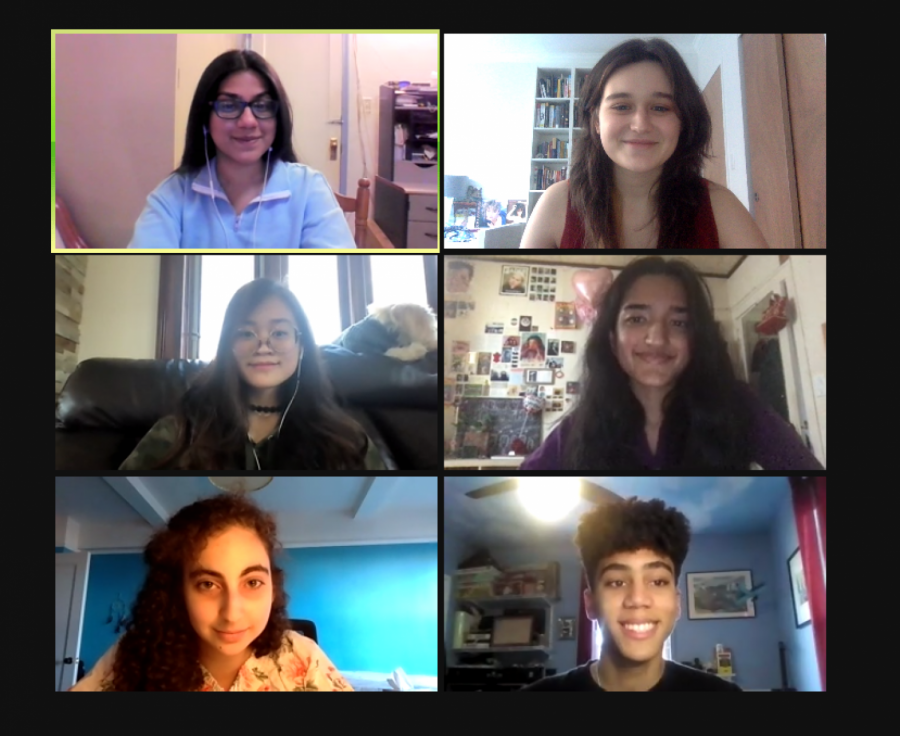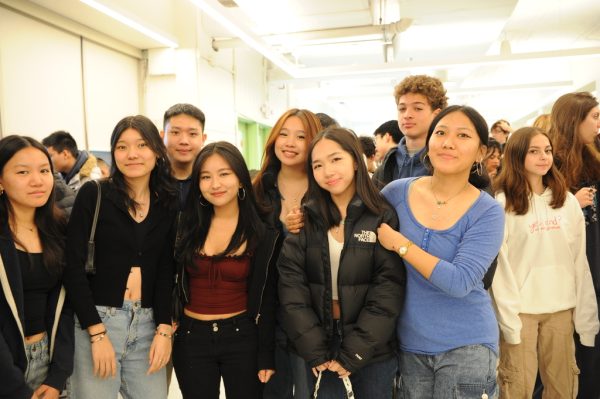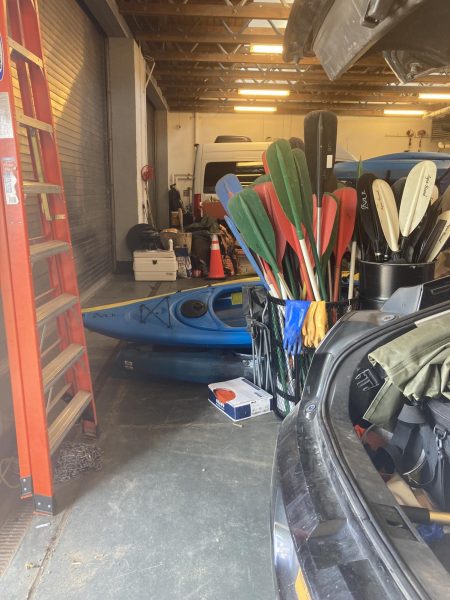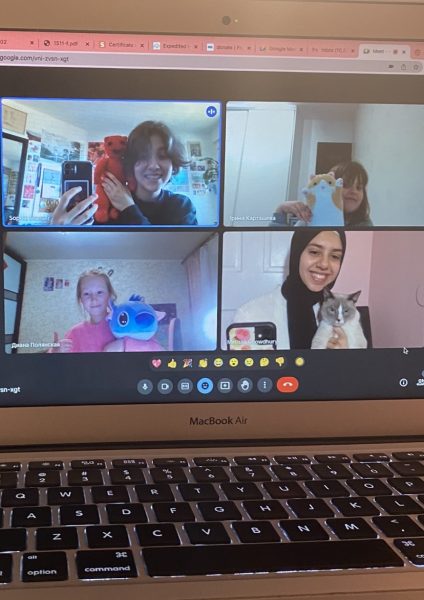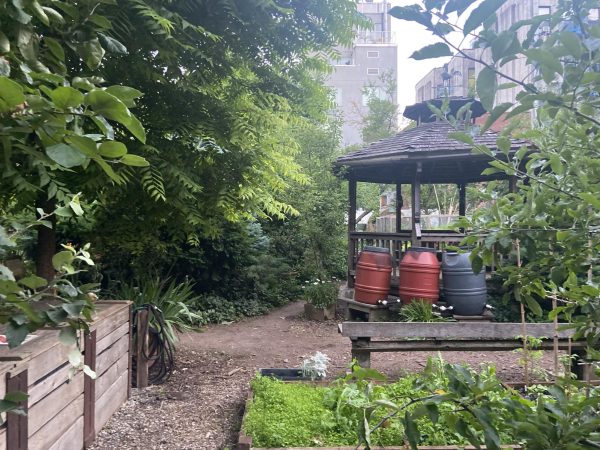March 2021 Advice Column: Navigating Our Virtual World !
Some of the 2020-2021 Editors-in-Chief of ‘The Science Survey’ answer your questions on negotiating schoolwork and life during the Coronavirus pandemic.
Here are some of the Editors-in-Chief of ‘The Science Survey’ during a Zoom meeting as they planned out this advice column. From left to right, top to bottom: Samama Moontaha ’21, Edie Fine ’21, Alina Chan ’21, Lavanya Manickam ’21, Maggie Schneider ’22, and Michael Toscano ’21.
Hey, Bronx Science!
We are hoping that you have a more positive Spring 2021, given the increased pace of vaccine roll-out (hope for the future, post-pandemic) and the fact that the weather is warming up, allowing for more socially distanced safe outdoor activities! Everyone should be very proud of themselves for getting through this tumultuous and unusual first six and a half months of mostly or completely virtual schooling during the 2020-2021 academic year. We hope you’re finding some time to celebrate the fact that you’re already more than halfway through, and that you’ve found some time to rest and relax, in the meantime.
We were glad to receive so many important questions from you for our latest advice column, below! We love being able to provide you with some insight and support during this time, a time that can feel so disconnected for all of us. What we’ve noticed, reading over all of your submissions of questions, is that while each experience captured in the questions is unique, there are many universal struggles. I hope there can be some comfort in knowing that a lot of us are going through similar hardships right now.
Below, you’ll find answers to some of your questions, covering topics such as navigating the college process virtually, how to deal with conflict, maintaining a balance between work and social life, and many more. And again, if you ever have any more questions that you’d like to see answered, please feel free to fill out this form! Your new questions will be addressed in future Advice Columns for the April 2021 and June 2021 Advice Columns, so please ask away!
Love,
Your Editors-in Chief for 2020-2021 (Edie Fine ’21, Michael Toscano ’21, Lavanya Manickam ’21, Maggie Schneider ’22, Samama Moontaha ’21, and Alina Chan ’21)
P.S. Here is a ‘Table of Contents’ for you to use to navigate through the questions addressed, below:
Navigating Conflict
Social Life / School Balance
Virtual College Process
Staying Motivated
College Recommendations
Extracurriculars
Engaging on Zoom
Can you give advice about how to clearly communicate with someone during conflict, especially when they think that everything they do is right, even though it’s not?
Communicating through conflict can feel quite intimidating. But it is so so necessary! We all inevitably face conflict in our relationships, so learning the best skills and tactics with which to go about these conflicts is essential.
The first tip I will offer is to work on recognizing conflict as a neutral force; once we understand that it is unavoidable, we can begin to approach it as something that is not inherently good or bad. I’d also encourage you to approach these conversations as “conflict transforming,” rather than “conflict resolving.” If you begin the conversation with a singular agenda of changing their mind and simply resolving the conflict, it is likely that the other party will not feel welcome or comfortable to engage with you. So, if you approach the conflict as something that you want to get to the root of, there will be a lot more capacity for change.
But what does this look like in practice?
I would suggest a few fundamental rules. The first (and I think most important), is to always “speak from the ‘I’.” What this means is that you only speak from your own experiences (try avoiding the accusatory “you”). Let the guiding topic of the conversation be the way that their behavior or opinions make you feel. There is a difference between intention and impact, and you can only speak to the impact of their actions. Let them know what you’re experiencing.
And, with that, it is necessary for you to hear them out. If you can, ask them if they are willing to “speak from the ‘I’” as well, so that you can get a better idea of what is motivating them.
Other than this, there aren’t universal guidelines to go about transforming conflict. It is also necessary to recognize that this process might be extremely frustrating. You might not have control over the other party nor always control over the outcome, but what you do have control over is how you approach the discussion, and how you make space for both of your experiences and feelings to attempt to get to the root cause of the conflict.
– Edie Fine ’21
How do I better find a balance between getting my school work done and trying to have fun and relaxing during the Coronavirus pandemic?
This is such an important question, so thank you for asking! To be perfectly honest, everyone has their own routine style that works the best for them. However, a universal rule that I can offer is to set aside semi-concrete periods of time for school work, for social time, and for self time. For example, since I don’t have control over my school schedule, I assign the first 8 hours of my day for getting work done. This leaves a few extra hours beyond my class time to do homework, study, or get any extracurricular work done as well.
After that, I free up my schedule to get on FaceTime with friends and family, go out for walks, pamper myself, etc. These are super flexible and broad schedule breakdowns, but that’s exactly what makes it so successful. I can obviously allow myself to watch a quick YouTube video in the middle of my “work day,” but with the mentality that I shouldn’t be redirecting my efforts towards more fun activities ensures that I’m being productive, getting my work done, and setting myself up to have a comfortable and relatively stress-free time during the second half of my day.
This balanced schedule also makes sure that you aren’t prioritizing one activity over the other, since finding the time to both relax and be productive is extremely important. Remember, these two things can be complementary! This may be easier said than done to begin with, but once you get the hang of it, there will be no going back! Simply begin with telling yourself that studying and school work is not more important than looking after yourself and allowing time to socialize with others.
– Samama Moontaha ’21
I am a current junior and am starting the college process for next year. In the days before the COVID-19 pandemic, I would be able to visit colleges in person, see the campus in person, and ask questions in person about the college. Now, I can no longer do any of this. How would you recommend researching colleges and best learning about colleges during this time of mostly remote learning, for Bronx Science and for colleges alike?
This is an important question that I know many current juniors will have going into their senior year. First off, the uncertainty of the college process is something you can not control, so don’t let it cause you any unnecessary stress! Colleges across the country have made many extraordinary changes this year in order to help prospective students explore their schools, safely from home. In my college search, I can’t tell you how many Zoom informational sessions and virtual visits I attended. I would say that these events are as close as you can get to a traditional school visit in our current virtual times. At these events, you can see the school’s campus, dorm rooms, learn about their curriculum and clubs, and even pose your questions to admissions officers and current students. It definitely helps to take notes during these presentations for later reference. As a side note, remember that your guidance counselor is available to help you with the college process. Hopefully by the time you are applying for colleges you will be able to visit schools in-person, but for now, these virtual events are a great option to discover the right college for you!
– Michael Toscano ’21
This process can seem so daunting to have to navigate virtually! But, as second semester seniors, we’ve been there — so know that it is definitely possible, and that you can definitely do it. Here are some of my tips to getting through it successfully and in an organized manner (so as to avoid the feeling of being overwhelmed). I found that all of the informational sessions and virtual tours that I was attending tended to blur and merge together in my head. So, I made sure to create a note taking system that would keep all of my thoughts and opinions organized and codified, so that I didn’t have to rely on my fuzzy memory.
One thing that was very helpful for me was creating a pre-written notes doc that I copied for each of the schools that I researched; on these docs, I included different sections that were important to me to learn about (i.e. a section about the curriculum of the respective school, one on the location and area, one on the dance program, and another on their publications). It was sort of a like a “fill-in-the-blanks” type of situation. Choose what is most important to you to find in a school, and organize your notes around these factors. I made a folder with all of my school notes docs, and eventually logged them all into a spreadsheet that I ultimately used to document the dates that applications were due and to keep a log of my supplemental documents as well. Having a central location for all of this information was very helpful for me!
– Edie Fine ’21
How do I stay motivated when everything I’ve been looking forward to has been canceled due to the ongoing COVID-19 pandemic?
Haha, I’ve been asking myself this same question! In all honesty, it can be extremely hard to remain excited about school when one of the best parts of attending Bronx Science were the in-person events that occurred after hours. Whether you stayed after SGI to watch the Girls’ Varsity Basketball team win yet another game or enjoyed the Drama Department’s musicals in-person, most of our best high school memories revolved around our shared extracurricular activities.
With that in mind, I think it’s important to recognize that it’s completely okay if you’re not quite 100% motivated these days. Social interaction is a fundamental aspect of human health, so if you are not feeling especially prolific during a time where interacting with others is taboo — that makes sense! Forcing a positive attitude all the time can sometimes drive low moments even lower, so try to practice acceptance when it comes to your negative emotions.
But, I totally get it. When I realize that I have been scrolling on TikTok for too long, and that the math homework on my table is beginning to oxidize due to how long it’s been untouched, I start to panic a little. So, instead of worrying about the hours that slipped past, I try to plan the hours ahead.
When I am not feeling motivated, the most difficult challenge is transitioning from the comfort of idleness to an academic mindset. One of my best pieces of advice to break this barrier is to get on working calls! Gather a few friends or classmates whom you know you can study with, and hop on a Zoom call. Not only is this a good way to see friends who are not in your classes, or even become closer with those in your class, but it’s also a great way to keep one another accountable. Juliet Daniel ’21, a very productive friend of mine who keeps gorgeous notes and a comprehensive bullet journal, recently told me that she gets the most work done on such calls. Daniel will be attending the University of Chicago in the fall. (She also recommends the Pomodoro Technique!)
I also would try setting up your environment so that doing schoolwork can actually be something to look forward to. Maybe completing that essay would seem a little less daunting if you were to type away with this fun keyboard, in the presence of a warm winter candle, with your favorite movie’s instrumental soundtrack in the background (I find the Kung Fu Panda one especially motivating). However, at the end of the day, motivation is internal. And if the candle begins to burn out while the Google Doc remains empty, it’s time to recall the infamous Nike slogan: just do it. The next few hours won’t be fun, but you can get through it. You’ve gotten through a global pandemic as a teenager, trust me — you can finish this DBQ.
As for non-academic life, it can be challenging to find the motivation to simply get out of bed when the day ahead of you will inevitably mimic the one that just passed. I try to look forward to the little things in life, now that COVID-19 has revoked the opportunity to attend big events. Each day, I ensure there is at least one thing that makes the day special — it could be getting on a call with a friend I haven’t spoken to in a while, going on a walk in my post-snowfall neighborhood, finally watching that a24 film, etc. While there aren’t many activities for us to do, I remind myself there is so much media in this world left for us to consume: millions of books, movies, and songs await us. Expose yourself to as many perspectives as you can now, so when we can go out into the world again, you can interact with others in ways that were never possible before.
– Lavanya Manickam ’21
I am a current junior and at this time need to ask two teachers for letters of recommendation for next year, one in the humanities and one in STEM. During normal times before the COVID-19 pandemic, I would simply ask a teacher in person at the end of class or during their office hours. Since many of us are still all remote, how would you recommend that I ask a teacher for a letter of recommendation during this time of remote learning?
I’m glad you asked this question — I’m sure that many juniors are wondering the same thing. Everything can feel so much less personal now that all of our classes and all of our time with our teachers are relegated to Zoom and Google Meets video classes, and that can make it hard to approach your teachers with a request as important as this one. But you can still find the time to connect with your teachers! I would suggest still asking in person, if you can. A perfect time might be during your teacher’s virtual office hours. This way, you’ll have some one-on-one face time, which can help to strengthen your connection and make the encounter more personal.
If you can’t attend your teacher’s office hours, a kind and thoughtful email can also do the trick. In it, make sure your teacher understands what their class has meant to you and why you are asking them for a request. This email should not be a ‘copy and paste’ response that you could have sent to any teacher, but personalized for them and for you. Express your gratitude for what you’ve learned, and explain what this recommendation might mean for you.
The final piece of advice I will give is to ask in advance. Your teacher will likely be receiving an overwhelming number of requests, so the sooner you ask, the better. If you want until June to make your request, chances are good that your teacher will have already committed to a maximum number of recommendations and will be unable to write any more, given time constraints.
– Edie Fine ’21
Even though I’m pursuing a few strong extracurriculars and taking two A.P. classes, it feels like practically nothing compared to what my friends and classmates are doing after school. My averages are in the low 90s which is a great thing, but when I see my friends getting 99s on their GPA and winning award after award for extracurriculars, I don’t feel good about my achievements at all. I know that the name brand recognition of the college that I end up attending isn’t the most important thing, but I don’t think I’m going to get into a well-known college because of how strongly everyone at Bronx Science outshines me.
I was definitely in your situation as a ninth grader and as a sophomore. It’s difficult to feel like you’re doing enough when you’re in such a diverse school where everyone is trying their best to stand out. It’s hard not to compare yourself to others, and I found myself constantly looking at others’ grades, stats, extracurriculars, etc. It’s easier said than done, but don’t look at others. Focus on yourself!
Your friends and classmates are going to end up where they’re going to end up, and you’re going to end up where you’re going to end up. Don’t worry about others; it might even prevent you from doing well. It’s not worth losing any sleep over. You are you; you can’t change that and you shouldn’t want to change it.
As for colleges, I’d say if you don’t feel strongly about your extracurriculars, perhaps look more into activities you’re really interested in. Everything really depends on the way you word it on the Common App, and so the more dedicated you are to a certain extracurricular, the better you can write about it. Tailor your application to focus on your strengths and interests (But that’s what you should be doing anyways; pick extracurriculars and courses that you’re personally invested in). Also, grades/extracurriculars/awards are not everything that’s taken into consideration, trust me! Almost anyone can get good grades, but what colleges want to see is an ambitious, intellectually curious student who will really make the most out of their time in college. It helps that Bronx Science is a prestigious school with high recognition. This will get you pretty far in the college process.
P.S. Don’t stress too much over college! Please remember that your grades, awards, and extracurriculars do NOT define you. You can go to any college and end up in an amazing place as long as you continue to work hard and be the best version of yourself you possibly can be. 🙂
– Alina Chan ’21
I tend to be shy during my Zoom class discussions. How would you recommend that I best leave my ‘comfort zone’ so that I can contribute to my Zoom video classes and increase my class participation grades?
Great question! It’s good to remember that there isn’t just one way of participating; you don’t have to verbally answer questions in order to contribute to a class. It can feel nerve-wracking to speak on Zoom, so starting off slowly is helpful. Keeping your camera on during class is already a great way to distinguish yourself. You can stand out just by showing teachers that you’re physically there.
If you want to generally speak more in class, I would recommend setting a number for how many times you want to participate per week. Making a resolution like this can give you a sense of having a “plan” and more control; you’re not deciding whether to speak on the spot.
Also, never be afraid of getting an answer wrong or asking a question! Showing effort and interest is infinitely times more important than seeming intelligent, not to mention another great way to demonstrate your engagement. When you’re unsure of a complicated question, explaining your thought process, even if it’s faulty, can help you to learn (I find myself much more likely to remember a concept if I described it incorrectly in a previous class).
– Maggie Schneider ’22
Edie Fine (she/they), an Editor-in-Chief for ‘The Science Survey,’ is thrilled to be on the journalism staff for a second year. She loves telling stories,...
Michael Toscano is an Editor-in-Chief of ‘The Science Survey.' As Editor-in-Chief, he is responsible for overseeing all major aspects of the newspaper,...
Lavanya Manickam is an Editor-in-Chief for ‘The Science Survey.’ She enjoys writing narratives that provide insight into various perspectives, and...
Maggie Schneider is an Editor-in-Chief of ‘The Science Survey.’ She loves journalistic writing because it is a recognition of the infinite number of...
Samama Moontaha is an Editor-in-Chief for ‘The Science Survey.’ She loves writing journalistic stories about the students at Bronx Science, bringing...
Alina Chan is an Editor-in-Chief for ‘The Science Survey.' She believes that when she writes, she gives herself, and others, a voice for self-expression....

